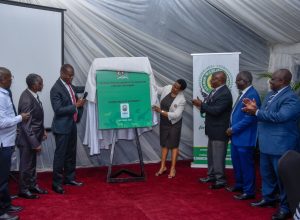KAMPALA – Government of Uganda has officially launched the National Wildlife Conservation Education Strategy. The strategy, which aims to deepen awareness and foster engagement in conservation, was unveiled as the Uganda Wildlife Conservation Education Centre (UWEC) handed over leadership to Uganda Wildlife Authority (UWA) after the merger in Kampala.
The launch of the National Wildlife Conservation Education Strategy marks a significant milestone in UWA’s ongoing efforts to protect Uganda’s diverse wildlife and natural heritage. The initiative is designed to engage citizens—particularly young people and local communities—in active participation, education, and conservation activities.
Speaking at the launch, the Minister of State for Tourism, Wildlife and Antiquities, Hon. Martin Mugarra Bahinduka said the strategy will be essential in educating Ugandans about the value of wildlife and instilling a sense of responsibility towards conserving our natural heritage for future generations.
On his part, Sam Mwandha, UWA executive director, highlighted the urgent need for a comprehensive and strategic approach to wildlife conservation.
He noted that conservation education is crucial in ensuring the protection of Uganda’s biodiversity for future generations.
“This strategy is a game-changer in promoting knowledge and positive attitudes towards wildlife conservation. It aims to inspire behavior change and engage communities to take ownership of protecting Uganda’s natural resources,” Mwandha stated.
The strategy is expected to address key challenges such as human-wildlife conflict, poaching, habitat destruction, and the loss of endangered species, particularly in wildlife-rich regions such as Queen Elizabeth National Park, Murchison Falls National Park, and Bwindi Impenetrable National Parks.
Community and Youth Involvement
Central to the National Wildlife Conservation Education Strategy is community engagement.
UWA will be partnering with local leaders, schools, and conservation groups to promote conservation activities in communities that border protected areas.
The strategy also places a strong emphasis on youth involvement, aiming to integrate wildlife conservation education into school curricula and foster youth-led conservation projects.
“We recognize that the future of Uganda’s wildlife lies in the hands of the next generation. Through education, we can equip young people with the knowledge and passion to safeguard our wildlife,” said Mwandha.
The strategy will be implemented in collaboration with various partners, including the Ministry of Tourism, Wildlife and Antiquities, NGOs, and international conservation agencies.
It seeks to create a nationwide conservation movement, leveraging the expertise of stakeholders in wildlife protection, environmental education, and sustainable tourism.
A Call to Action
As the strategy kicked off, UWA called on the public to actively participate in conservation efforts, whether through volunteering, supporting wildlife protection campaigns, or adopting eco-friendly practices.
The National Wildlife Conservation Education Strategy is set to be rolled out in phases, with pilot programs starting in regions most affected by conservation challenges.
UWA hopes that through this initiative, Uganda can build a culture of conservation that will protect its wildlife and natural heritage for future generations.
— Africa Tembelea Press



